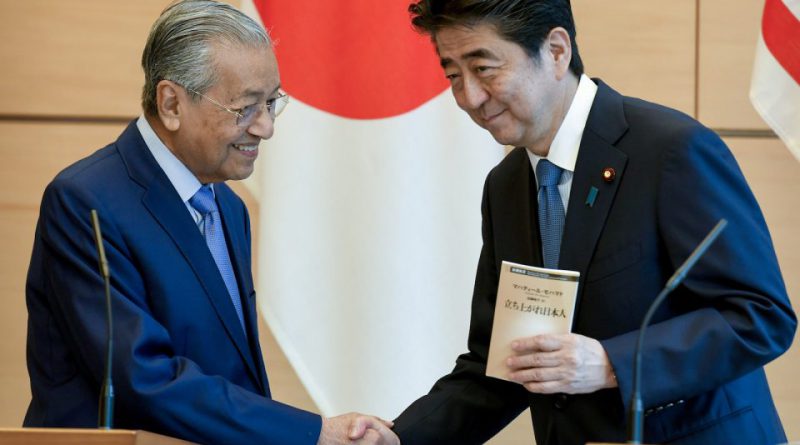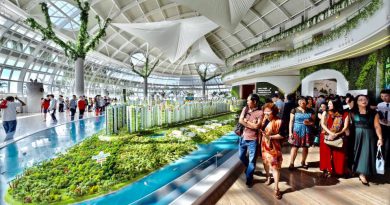Mahathir leans to Japan and away from China
Malaysia is waiting to be your profit center,” declared Prime Minister Mahathir Mohamad during his November 7 address to corporate figures and captains of industry at the Malaysia-Japan Economic Association forum in Tokyo.
Investors can expect Mahathir’s Pakatan Harapan government to uphold the rule of law in resolving disputes, said the 93-year-old premier, who also promised to remove obstacles to foreign investment in high technology and information technology-based industries in his country.
Economic ties aren’t the only area of cooperation tipped to expand as Malaysia-Japan relations blossom. Tokyo hopes Mahathir’s government will help persuade Association of Southeast Asian Nations (Asean) members to support its push for freedom of navigation in the South China Sea, a key transport artery for oil and freight bound to and from Japan.
For Malaysia – whose scandal-plagued former premier Najib Razak controversially sought robust economic and security ties with China – deeper relations with Japan under a revitalized “Look East” policy are seen as a strategic hedge against Najib-era over-reliance on Beijing and its ambitious global development financing.
Mahathir’s visit to Japan marked his third trip to the country since becoming prime minister for the second time in May. During his first stint as premier between 1981 and 2003, Mahathir promoted a “Look East” policy that promoted Japan as a model for Malaysia’s modernization and development.
The highlight of his latest three-day visit saw Emperor Akihito confer the world’s oldest statesman with Japan’s highest award – “The Grand Cordon of the Order of the Paulownia Flowers” – in a ceremony at the Imperial Palace.
The decoration was all the more meaningful considering how Mahathir – a self-professed admirer of Japanese culture – has encouraged Malaysians throughout his political career to learn from and emulate the Japanese character, work ethic and value system as a path to modernization.
The Malaysian leader has frequently praised the importance that Japanese culture places on taking pride in one’s work and the sense of deep shame that follows failure. Malaysians, he says, lack such a value system and are thus at a disadvantage when competing with countries such as Japan that possess a so-called superior value system.
Education Minister Maszlee Malik recently confirmed that three prestigious Japanese higher-learning institutions – Tsukuba University, Nippon Designers School and Ritsumeikan Asia Pacific University – have announced plans to establish overseas branches in Malaysia, which Mahathir had requested to better enable the cultural transference he has encouraged.
Malaysia’s nonagenarian premier also recently praised Japan’s pacifist constitution on anti-war grounds and said his government was considering the addition of a similar pacifist clause in its own charter that would restrict its military to self-defense-only capabilities. Japan’s constitution “should be copied by all,” he said in a recent interview.
Mahathir met his Japanese counterpart Shinzo Abe at the Prime Minister’s Office after his conferment. The two leaders also met during the premier’s previous visits to Tokyo when he was a guest speaker at two separate conferences in August and earlier in June, when Malaysia requested yen loans to help resolve the government’s debt predicament.
Mahathir’s government inherited a debt pile equivalent to 80.3% of gross domestic product (GDP), the result of profligate borrowing by the Najib administration linked to corruption at the 1Malaysia Development Berhad (1MDB) fund and hefty off-budget debt liabilities that commit the government to shoulder debts of cash-strapped state entities.
Around US$23 billion worth of Chinese-backed infrastructure projects, including a coast-to-coast rail link and two gas pipelines that Mahathir had argued on the hustings were lopsided in Beijing’s favor, have been either cancelled or deferred by his Harapan government to reduce the debt burden, a development that has tested Sino-Malaysia relations.
Finance Minister Lim Guan Eng announced in revealing the Harapan government’s inaugural budget that Abe’s administration has offered to guarantee 200 billion yen (US$1.77 billion) in low-interest “Samurai bonds” with a 10-year tenure. The bonds will give non-Japanese entities acting as issuers the ability to access investment capital available in Japan.
Lim said the yen-denominated bonds, which are expected to be issued before March next year, are to be guaranteed by Japan’s Bank of International Cooperation at an indicative coupon rate of 0.65% and signal the Japanese government’s confidence in the administration and leadership of Mahathir.
Proceeds from the bonds are slated to go towards retiring old loans with higher borrowing costs. Mahathir has indicated that Malaysia intends to source more low-interest capital from Tokyo to offset existing loans. Abe told reporters that further yen credit would be feasible for transport, education and human resource development initiatives in Malaysia.
Japan’s increasing financial assistance to Malaysia comes as the Abe administration moves to reassert its role in Southeast Asia infrastructure-building after having lost momentum in recent years, outshone by Beijing’s flagship US$1 trillion Belt and Road Initiative (BRI), a vast infrastructure plan to link China with major continental and maritime zones.
Tokyo began large-scale infrastructure financing in Southeast Asia in the 1970s and has traditionally offered countries in the region development assistance through low-interest loans and technical cooperation. China, by contrast, only began to offer Asean countries infrastructure financing in the early 2000s.
According to the London-based BMI Research, Japan’s infrastructure investment in the Asean region, including completed as well as ongoing ventures, amounted to about US$230 billion since the early 2000s through to year end 2017. Total Chinese expenditure in the region amounted to considerably less: US$155 billion over the same period.
While Japan dominates infrastructure investment in the Philippines and Vietnam, recent competition between Beijing and Tokyo for big-ticket deals and market share elsewhere has heightened as both countries place infrastructure at the center of their regional strategies to win influence in the current era of development finance diplomacy.
BMI Research underscores the extent to which China had gained ground in Malaysia relative to Japan. Since the 2000s, investments from Beijing accounted for US$47.27 billion compared to Tokyo’s $10.88 billion. Malaysia had been a relatively minor recipient of Chinese investment up to 2012 until Najib moved to substantially deepen ties.
Mahathir’s desire for a strategic rebalance favoring Japan appears to dovetail closely with the Abe administration’s strategy of prioritizing the export of overseas infrastructure to revitalize Japan’s long-stagnating economy. Though Japan has not initiated a vast regional interconnectivity scheme akin to BRI, it has emphasized another selling point: quality.
Through its Partnership for Quality Infrastructure (PQI) scheme launched in 2015, Tokyo has differentiated its regional connectivity offerings from those of China by emphasizing economic efficiency, transfers of technology and human resource development, two areas where countries like Malaysia have recently accused Beijing of falling short.
As Asia’s two biggest economies jostle to expand their influence in the Asean region, concerns over transparency, economic viability and debt risks surrounding China’s BRI have opened the way for Japanese firms to steal a march, a shift Mahathir has indicated he would welcome with open arms.
Source: AsiaTimes



